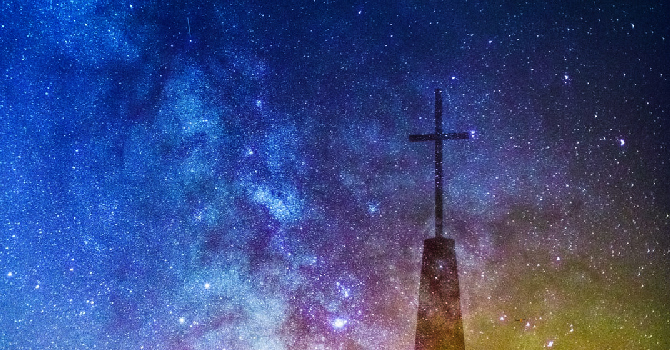At the beginning of each episode of “Down the Wormhole,” the Rev. Zack Jackson introduces listeners to the core concept of the podcast: “exploring the strange and fascinating relationship between science and religion.”
The podcast, which launched in August, addresses the tensions between science and religion, which many people assume are always at odds with each other.
 In weekly hourlong episodes, producer Jackson and co-hosts Ian Binns, Rabbi Rachael Jackson, Kendra Holt Moore and Adam Pryor, in varying combinations, engage each other as well as guest scientists, clergy, writers, educators, activists and artists on questions of science and faith. They hope to create a sense of sitting around a campfire or dinner table with some very interesting people, Jackson said.
In weekly hourlong episodes, producer Jackson and co-hosts Ian Binns, Rabbi Rachael Jackson, Kendra Holt Moore and Adam Pryor, in varying combinations, engage each other as well as guest scientists, clergy, writers, educators, activists and artists on questions of science and faith. They hope to create a sense of sitting around a campfire or dinner table with some very interesting people, Jackson said.
We have arrived at a pivotal moment in our species’ history, he said. The project, for Jackson, is an effort toward the continued survival of human beings -- to help people work with science and faith together.
“We have the technology to obliterate ourselves,” he said. “Nukes aside, we are already kind of doing that in slow motion while we poison our planet. And a lot of that is being driven by willful scientific ignorance.”
The ignorance, Jackson said, is in some cases being solidified by faith leaders who are teaching people not to think -- insisting that there is a war between science and faith that can only be won by denying science.
“We either need to become generally more scientifically literate and learn how to work with our faith instead of against it, or we will probably end up destroying ourselves,” Jackson said. “And obviously, we’re not going to fix that with a podcast. But, you know, you’ve got to do something.”

With five co-hosts coming from different perspectives -- four Christian, one Jewish -- the podcast can explore interfaith issues, theology, science and how they all interrelate. Six episodes have been released so far, and the group has more than 60 planned, as well as several miniseries, Jackson said.
The first three episodes lay the foundation for the discussion, and the next three look at conflict language. In future episodes, the hosts plan to take on neuroscience, education, technology, sci-fi and even politics. “Down the Wormhole” is available on Stitcher and Apple Podcasts, as well as other platforms.
The science and religion interplay is personal to Jackson. He grew up wanting to be a rocket scientist but was called to faith just before college. Now a pastor at Community United Church of Christ in Reading, Pennsylvania, Jackson lives at the intersection of science and faith.
He describes his process as “exploring caves” -- pursuing answers to many different questions about his faith every day.
“There are certain tunnels that people have explored before that they know are beautiful and good, and you can go there,” he said. “But sometimes you go off track, and you might find some beautiful cavern or you might get stuck and have to retrace your steps. But you’ll never know unless you go.”
Part of Jackson’s work in science and faith led him to Sinai and Synapses, a 2017-2019 fellowship that brought together a small interfaith group of clergy, scientists, professors and writers to elevate the discussion around science and religion.
During the group’s meetings in New York City, Jackson got the idea to start a podcast. There were amazing conversations happening in breakout sessions and small groups, he said, but no “translator” to get it out of the room to the people who don’t have resources to address their science and faith questions.
Jackson thought about doing it himself but recognized that he couldn’t do it alone. Then Binns, another Sinai and Synapses fellow and an associate professor of elementary science education in Charlotte, North Carolina, approached him and said he wanted to start a podcast, too. From there, “Down the Wormhole” came to life.
The project is funded by the five co-hosts, and they record on their own mics in their respective locations across the U.S.
For Holt Moore, a Ph.D. candidate in religion and science at Boston University, the planning process started in a “chaotic but exciting” document -- coming up with the name of the podcast, topics, guests and goals.
“My participation in this podcast is a way to take what I’m learning in an academic institution and find a way to communicate that with people who maybe will never go to college or who don’t know how to engage in that content,” she said. “I care about teaching, and I know that can happen in many different forms.”
Pryor, an associate professor of religion at Bethany College in rural Lindsborg, Kansas, said that the experience of exploring science and faith on your own, outside the context of a university, “can be kind of a lonely place.”
In early discussions about the podcast, they had about 150 ideas, from scientific and religious authorities to climate change, Pryor said. For him, the focus is on public engagement and helping people think about those questions that might otherwise be difficult to find answers to.
“My experience has been that students are very uncomfortable and fearful of asking questions about other faiths for fear of being perceived as prying or rude, or they don’t want to accidentally offend someone,” he said. “So for me, what’s been exciting is using science as a common language.”
Pryor figured this out working with farm kids, he said. Having grown up in rural areas, those students have a deep appreciation for the practical implications of science -- even though they may not put it that way, he said. They know ecology and they know genetics, and the conversation about science and interfaith issues can begin with nature and ecological theology.
For Holt Moore, the special thing about the podcast is the many different perspectives the group brings together.
“For anybody who has started listening to our podcast, I think it’s clear that we’re figuring it out as we go,” Holt Moore said. “But it’s also fun because it is so new for us, and there’s a genuine curiosity that everyone has who is part of the conversation.”
Listen to the podcast trailer:



















